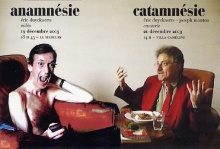Creator:
Éric Duyckaerts
Joseph Mouton
Performer:
Éric Duyckaerts
Joseph Mouton
Occurence:
Places:
Starting date:
12 20 2003
Topology:
Organization:
Adress:
43 avenue Montplaisir
Nice
FranceDocuments:
Carton d'invitation
Type:
Imprimé
Technique description référence:
Carton d'invitation


Témoignage:
Joseph Mouton pour Éric Duyckaerts et lui-même | Catamnésie, 2003
 ''
''